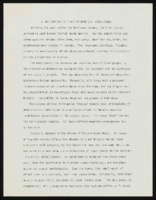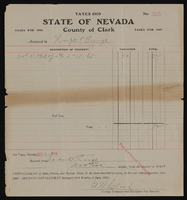Search the Special Collections and Archives Portal
Search Results
K. O. Knudson Photograph Collection
Identifier
Abstract
The K. O. Knudson Photographs (approximately 1920-1969) depict the Las Vegas Grammar School and service, fraternal, and veterans organizations gathered by retired Las Vegas, Nevada school administrator and World War I veteran K. O. Knudson (also known as K. Oscar Knudson). The collection includes images of Knudson, Las Vegas Masonic Lodge members, American Legion members, and school dances. The photographs primarily feature Las Vegas, Nevada.
Archival Collection
Nevada Consolidated Copper Company Records
Identifier
Abstract
The Nevada Consolidated Copper Company Records (approximately 1907-1978) contain the business records of the company, including correspondence, freight bills, ledgers, maps, leaching data, and books relating to mining. The majority of the records post-date the company's name change to Kennecott Mining Company.
Archival Collection
Charles P. and Delphine Squires Papers
Identifier
Abstract
The Charles P. and Delphine Squires Papers from 1882 to 1964, with bulk dates from 1905 to 1964, contain book and short story manuscripts, articles, press releases, newspaper clippings, and radio scripts written by Squires and his wife, all relating to their early life in Las Vegas. Also included are report cards, certificates, Parent Teacher Association material, Mesquite Club records and church activity materials.
Archival Collection
Nevada Test Site Oral History Project Records
Identifier
Abstract
The Nevada Test Site Oral History Project Records (approximately 1950-2008) consist of oral histories collected by University of Nevada, Las Vegas Department of History for the Nevada Test Site Oral History Project. The collection includes digital audio recordings of interviews, print and digital transcripts, and a small selection of digital video recordings. Some interviews have also been supplemented with photographs, letters, scientific articles, brochures, news clippings and ephemera about the Nevada Test Site.
Archival Collection
Thomas Clark Professional Papers
Identifier
Abstract
The Thomas Clark Professional Papers (1950-1998) contain materials from his tenure as a Professor of English at the University of Nevada, Las Vegas (UNLV), which are divided into two series. The gaming research series includes newspaper clippings, correspondence, brochures, bulletins and articles. Also included are book chapters, a glossary of terms used in the casino industry, and gambling guides. In the linguistics and teaching series there are research files, articles, speeches, correspondence, interviews, multimedia, workshops, and conference materials. Also included are files on graffiti, symbolism, ethnic and regional speech differences, language usage, and National Council of Teachers of English (NCTE) material. Additional materials include colleague publications and cassette tapes of interviews from students in courses Clark taught at UNLV.
Archival Collection

Transcript of interview with Renee Diamond by Barbara Tabach, November 20, 2014
Date
Archival Collection
Description
In this interview, Renee Diamond discusses coming to Las Vegas via Los Angeles, with her husband and children in the 1970s and getting involved in politics. She talks about her husband, Leo, and his business selling vinyl records in L.A., and her work in a doctor's office. Once in Las Vegas, the Diamonds joined Temple Beth Sholom and later Congregation Ner Tamid. Renee talks about her involvement in the political arena in southern Nevada, including the League of Women Voters.
Community activism and social justice rank high in the legacy of Renee Diamond. She often refers to herself as one of the last of the generation without college degrees that could make a difference in the politics of the state. When Renee, her husband Leo Diamond moved their family to Las Vegas from southern California, the energetic advocate Renee quickly plugged into the community. The word "No" was not part of her vocabulary. Among the many Jewish and secular activities the she engaged in were: the editorial board of the Jewish Reporter newspaper; Hadassah; Anti-Defamation League; Red Cross Board; State Museum Board to name a few. She remains a vibrant Democratic Party leader and served one term on the Nevada Assembly in 1989. She was on the front lines as a fierce and active supporter of Welfare Rights, Fair Housing and the Equal Rights Amendment. It is a life that included working alongside illustrious women and men of Southern Nevada history. A list that includes: Harriet Trudell, Ruby Duncan, Myrna Williams and Dorothy Eisenberg and many more mentioned here. Meanwhile she raised four children and enjoyed a loving 43-year marriage with Leo (aka "Uncle Leo") whose career included the popular Bingo Palace, Slots-A-Fun and Stations Casinos. During this oral history interview she recalls the Las Vegas that she moved to in 1972 and reflects on what attracted people here, ways to be part of the Jewish life which might even include a bowling league and how involvement in raising social awareness was a worthy investment of ones' time. This is a look at a woman who made a difference.
Text

"A Half Century of Black Memorabilia: 1890-1940s": manuscript draft by Roosevelt Fitzgerald
Date
Archival Collection
Description
From the Roosevelt Fitzgerald Professional Papers (MS-01082) -- Unpublished manuscripts file.
Text

Gabriel Garcia oral history interview: transcript
Date
Archival Collection
Description
Oral history interview with Gabriel Garcia conducted by Monserrath Hernandez and Barbara Tabach on November 13, 2019 for the Latinx Voices of Southern Nevada Oral History Project. In this interview, Garcia discusses his early life in Arizona and moving to Las Vegas, Nevada in 1984. He remembers attending a sixth grade center, the Pacific Engineering and Production Company of Nevada (PEPCON) explosion, and attending Las Vegas High School. Garcia talks about Mexican culture in Las Vegas, car clubs, and becoming a graphic designer. Lastly, Garcia discusses his involvement with the Association of Latino Professionals for America, and the idea of diversifying the professional workplace.
Text

Tax bills and receipts: Sadie George
Date
Archival Collection
Description
Text

